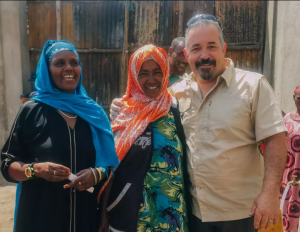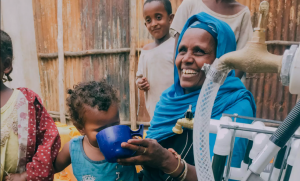This story begins with a bicycle-powered swimming pool pump in Haiti and ends with 400 inmates in Washington building water filtration systems for Ethiopian prisons. Many dots must be connected to get from one to the other, and they all pass through a California plumbing contractor named Andy Pierce.
From aid worker to entrepreneur
Pierce’s journey began in 2010, when he traveled to Haiti to rebuild and install indoor plumbing in a girls’ orphanage damaged by the devastating earthquake that had hit the island in January.

Former California plumbing contractor Andy Pierce (right) is the founder of Project 41, an initiative that enlists Washington-state prison inmates to build water filters for use in water-scarce parts of Africa. Photo courtesy of Project 41.
“We had a rainwater capture system, but no source of power to pump the water into the orphanage,” Pierce explained. Pierce devised a way to power a swimming pool pump using an ordinary bicycle mounted on a frame.
“It was meant to be a one-off, created just for the orphanage,” he explained. But other humanitarian agencies took notice, and soon, Pierce was invited to install another bicycle-powered pump in a Ugandan health center.
Meanwhile, back in the states, the recession had hit Pierce’s business hard. With time to focus on his newfound passion, he began collecting used pool pumps.
“Initially, we collected used pool pumps from 10 locations in California,” he explained. “It was messy and expensive, and the pumps were in all different conditions.” Later, a large pool pump manufacturer donated 400 new pumps. In all, he built about 600 bicycle-driven pumps that could be used for irrigation. The pumps were shipped to Africa, where partners constructed the frames needed to mount a bicycle onto the pump.
These pumps are not designed to pump water long distances or to high elevations. “But for a subsistence farmer living near an open water source, it’s good for moving 50 gallons of water a minute,” Pierce said.
His efforts were successful – to a point. “People’s lives were improved,” said Pierce. “But it was expensive. We were trying to establish a sustainable, market-driven model, where the end user in the developing world had an investment in the system as well. The developing world is littered with aid that has been given, but not maintained. We were trying to avoid that, but we couldn’t quite figure out how.”
A slight change in direction
With the support of humanitarian group Assist International (Ripon, Calif.), Pierce founded Project 41, a Redding, Calif.-based nonprofit focused on improving access to clean water in the developing world. His work shifted to providing water filtration systems to health centers in Africa, Asia and South America.
“We found a way to put an already available product into an inexpensive filtration system that would be user-friendly in the developing world,” Pierce said. Using hollow-fiber membrane technology, the system removes 99.99999% of all bacteria, protozoa, and cysts. It can provide a near endless supply of clean water at 11 L/m (3 gal/m).
Still, finding partners, navigating international regulations, and keeping Project 41 financially afloat were a struggle, Pierce said. That’s when a member of Project 41’s board suggested he attend that year’s Mother Earth News Fair in Oregon.
…And then another
On the fair’s final day, Pierce received a visit from Chris McGill and Robert Branscrum. Both were corrections specialists representing the Sustainable Practices Lab at Washington State Penitentiary. There, eligible inmates complete a 13-week environmental curriculum, where they learn about recycling and green technologies. Graduates go on to build furniture and other objects from donated, recycled materials.
Pierce accepted an invitation to visit the lab to see it for himself and was impressed with what he saw.
That was a little over 3 years ago. With funding from a state grant, inmates began building Project 41’s water filters soon thereafter to support a pilot program in Ghana, Uganda, and Kenya.
“Our hope was that we could manufacture the filters cheaply, and then people in developing countries would purchase them at a margin that would allow for reinvestment,” said Pierce. He found, however, that the emerging middle-class who could afford to purchase the filters were people who could afford to purchase bottled water.
“We weren’t hitting our target clients – the people we wanted to help,” said Pierce.
Enter the Ethiopian prison system

Project 41’s filtration systems use hollow-fiber membrane technology to remove 99.99999% of all bacteria, protozoa, and cysts. It can provide a near endless supply of clean water at 11 L/m (3 gal/m). Photo courtesy of Project 41.
Still, word about the filtration systems was spreading. An Ethiopian prison ministry contacted Pierce, asking if Project 41 could help provide clean water to the nation’s 120 prisons.
Pierce agreed to pilot the program in a single prison, which housed about 2,000 inmates. “The prison is served by a municipal water supply,” explained Pierce. “But the power goes out and the supply shuts off three or four days a week. There is no water storage; there is nothing in reserve.” Also, the municipal water is not filtered and is unfit to drink.
After assessing the prison’s needs, Project 41 set out to raise the funds needed to purchase and install a 40,000-L (10,500-gal) water storage system, along with the filtration system needed to make it drinkable.
Completed this past March, the project was an overwhelming success, said Pierce. “The prison now has a reliable source for regular water use and a clean source of drinking water.”
Pierce is now working to secure the financing needed to bring a similar storage and filtration system to a 600-inmate prison in a dry region of northern Ethiopia that can go as many as 20 days without water.
Lessons learned
Pierce said he has learned lots about helping developing countries over this past decade.
“One lesson I’ve learned is that invention is great, but it’s less than 5% of the solution,” he said. “You also have to be able to get it to the people who need it and in a form that can be useful to them.”
As for Project 41’s partnership with the Sustainable Practices Lab?
“It’s one of the best things about our work,” said Pierce. “It’s a wonderful place, and the prisoners are amazing. These men are trying to make a difference. The fact that they are helping inmates on the other side of the world is the icing on the cake.”
— Mary Bufe, WEF Highlights








June 17, 2019
Featured